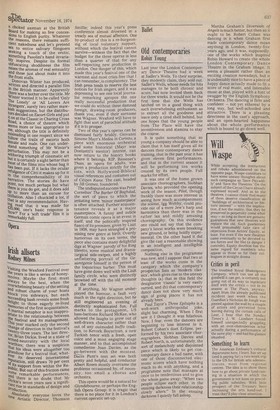Op era
hish allsorts
11°dneY Manes yisiting the Wexford Festival over he years is like a series of honeytnn cons. Maybe the first must a'ways be the best, when the overwhelming beauty of the setting and robust charm of your hosts Itriock you sideways, but each ,4811e.ceeding bash reveals some fresh • light to those eagerly re-lived Ternories of the first acquantaince. Marital netaphor is not inapproPnate to the relationship between Pue. festival and its management. ms`118 Year marked only the second "arige of direction in the festival's r.venty-three years. The last three • Brian Dickie, lived in a state of arrned-neutrality with the local Wa,c)rttlies; there was a suspicion at his ideas were altogether too :randiose for a festival that, whatver its deserved international
re .
. .P.utation, still draws 70 per cent its. support from within the RePs‘sublIc. But out of this friction came e remarkable performances, there is no doubt that Mr lekie's seven years saw a sign `ant rise in standards of design and Production. n eAbsolutely everyone loves the W Artistic Director, Thomson Smillie; indeed this year's press conference almost drowned in a treacly sea of mutual affection. One by-product of this is a re-burgeoning of local voluntary support, without which the festival cannot survive—witness the fact that the budget for the three operas is less than a quarter of that for any self-respecting new production in London. One danger of this, which made this year's festival one of the warmest and most crisis free that I can remember, is complacency. The Irish press tends to reserve the best notices for Irish singers, and it was depressing to see one local journalist remarking apropos the one really successful production that we could do without these damned foreign, drawing-room producers, thank you, even if their surname was Wagner. Wexford will have to fight that sort of parochial attitude if it is to prosper. Two of this year's operas can be dismissed fairly briskly. Giovanni Simone Mayr's Medea in Corinto, a piece with enormous orchestral and some historical (Mayr was Donizetti's mentor) interest, can now return to the history books where it belongs. RIP. Bassenet's Thais, an opera for adults, was given a production strictly for the tots, with Hollywood-Biblical visual references and costumes out of Citizen Kane. The cast, headed by Jill Gomez, foundered. The undisputed success was Peter Cornelius' The Barber Of Baghdad, the sort of piece to which the irritating term 'minor masterpiece' is often attached. Further acquaintenance reveals it as a major masterpiece. A funny and subtle German comic opera is an event in itself, and the politically inspired fiasco of its premiere, given by Liszt in 1858, may have strangled a promising new genre at birth. Overtly humorous on its own terms, the piece also contains many delightful digs at Wagner: parody of his Ring libretto, some musical and dramaturgical side-swipes, and a highly unflattering portrait of the Gesamtgenie himself in the person of the loquacious barber. This must have gone down well with the Liszt family circle, who were distinctly browned off with the old monster at the time.
If anything, Mr Wagner underplayed the humour, a fault very much in the right direction, but he still engineered an evening of distinctly sophisticated fun. Full marks to the protagonist, US bass-baritone Richard McKee, who allowed the laughs to grow out of well-drawn character rather than out of any outmoded buffo tradition, to Kevork Boyaciyan, a new Turkish tenor with a fresh, open voice and a most engaging stage manner, and to that accomplished comedienne Joan Davies, as the go-between with the mostest. Dacre Punt's tent set was both pretty and helpful, and conductor Albert Rosen mostly overcame the problems occasioned by, of necessity, too small a chorus and orchestra.
This opera would be a natural for Glyndebourne, or perhaps the English Opera Group: it is tragic that there is no place for it in London's current operatic set-up.


































 Previous page
Previous page